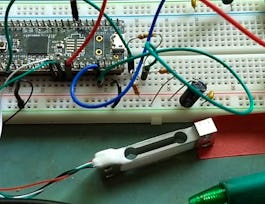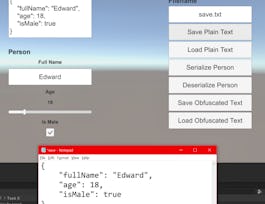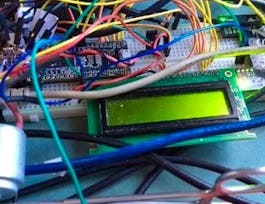This course can also be taken for academic credit as ECEA 5341, part of CU Boulder’s Master of Science in Electrical Engineering degree.
This is our second course in our specialization on Embedding Sensor and Motors. To get the most out of this course, you should first take our first course entitled Sensors and Sensor Circuits. Our first course gives you a tutorial on how to use the hardware and software development kit we have chosen for the lab exercises. This second course assumes that you already know how to use the kit. After taking this course, you will be able to: ● Understand how to specify the proper AC or DC motor for a machine design. ● Integrate the motor to a machine, based on analysis of motor equations for voltage, current, torque and speed. ● Implement the motor and accompanying rotary sensor into a motor control circuit in both hardware and software. ● Add a motor and motor control circuit into a microprocessor based development kit. ● Create hardware and firmware to process motor feedback data to a microprocessor for further evaluation. You will need to buy the following components to do the two course projects based on the videos in this module. Note that if you have already purchased the PSOC 5LP PROTOTYPING KIT, you do not need to buy it again. These parts may be purchased off the Digikey web site, www. Digikey.com. Or, you may obtain the specs from the site, and purchase them elsewhere. These are the part numbers for the above table, the lab on Motor Voltage and Current Measurement. You can copy and paste them into the search engine on the Digikey web site. You need one of each except for the AA batteries (N107-ND), which you would need 3. 428-3390-ND P14355-ND FQU13N10LTU-ND N107-ND 1N5393-E3/54GICT-ND RNF14FTD1K00CT-ND P0.62W-1BK-ND Additional equipment needed: • Wire - various gauges and lengths • Breadboard • Oscilloscope – suggested models are: o PICOSCOPE 2204A-D2 available on www.digikey.com or o Digilent 410-324 | OpenScope MZ available on www.newark.com Depending on your budget, you can also investigate these models: o Hantek HT6022BE20MHz - https://www.amazon.com/dp/B009H4AYII o SainSmart DSO212 - https://www.amazon.com/dp/B074QBQNB7 o PoScope Mega50 USB - https://www.robotshop.com/en/poscope-mega50-usb-mso-oscilloscope.html o ADALM2000 - https://www.digikey.com/en/products/detail/analog-devices-inc./ADALM2000/7019661




















